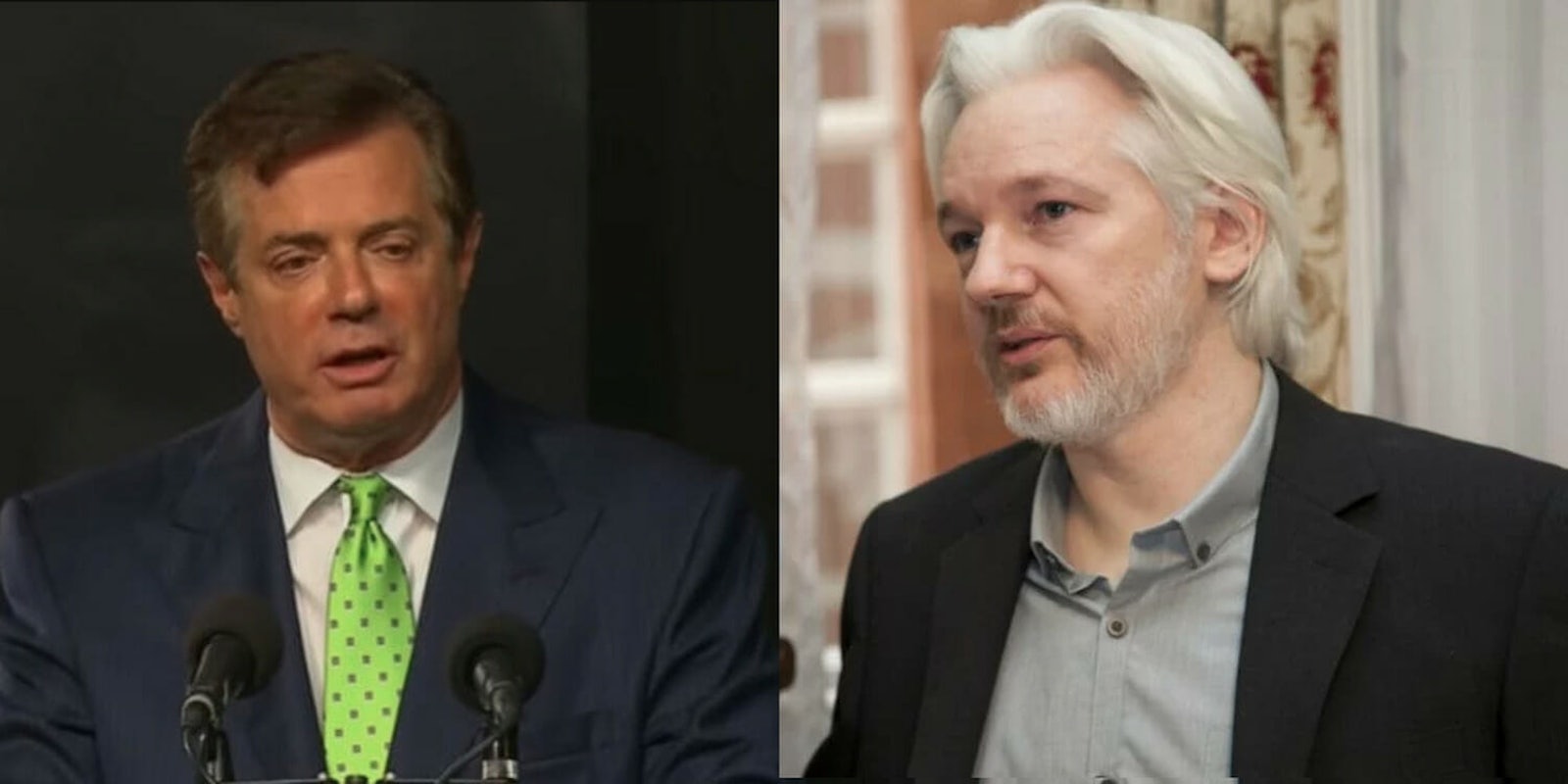Critics and supporters of WikiLeaks voiced skepticism at what appeared to be an explosive report published by a British newspaper on Tuesday, tying Trump campaign chairman Paul Manafort to the transparency organization’s founder Julian Assange.
The article, published in the Guardian, claimed that Manafort met with Assange in the run up to the 2016 presidential election and on two other occasions—in 2013, 2015, and in March 2016—at the Ecuadorian Embassy in London, where the WikiLeaks founder has resided since 2012 to avoid U.S. extradition.
WikiLeaks, of course, went on to publish hacked emails from the Democratic National Committee and Hillary Clinton’s campaign in the run-up to the Election Day, in late 2016, to devastating effect on the Democrat’s presidential bid.
Speaking to special counsel Robert Mueller’s team, investigating the hacking and allegations of Russian-Trump campaign collusion, Manafort has repeatedly denied any involvement.
When the Guardian published allegations on Tuesday that Manafort had met with Assange, citing anonymous sources and an Ecuadorian intelligence agency memo, the organization responded immediately to slam the report.
Remember this day when the Guardian permitted a serial fabricator to totally destroy the paper's reputation. @WikiLeaks is willing to bet the Guardian a million dollars and its editor's head that Manafort never met Assange. https://t.co/R2Qn6rLQjn
— WikiLeaks (@wikileaks) November 27, 2018
Indeed, in the hours that followed, high-profile journalists and commentators, both critics and supporters of WikiLeaks, began to scrutinize the article and question its authenticity. Under pressure, the publication appeared to back down slightly on its assertions, making some edits to distance itself from the claims.
Ninety minutes after publication the Guardian modifies its "Manafort held secret talks with Assange" headline to add ", sources say". pic.twitter.com/zcg8cQcYGq
— WikiLeaks (@wikileaks) November 27, 2018
Now, both Manafort and Assange are setting out to sue the newspaper for libel.
Here are just some of the reasons you might be skeptical of the Guardian’s Manafort-Assange report:
Uncritical reliance on anonymous sources
The report heavily relies on the testimony of multiple anonymous sources from within the Ecuadorian government and intelligence services. While this alone is not a reason to write-off the allegations entirely, since anonymous sources can often be key to unlocking a big story, the uncritical acceptance and dependence was seen as a red flag by other reporters.
https://twitter.com/benjaminwittes/status/1067430810821652481
The secret memo and Ecuador’s partisan intelligence agency
To bolster its claims, the article relies on an internal document written by Ecuador’s former spy agency (which was shut down in 2016), the National Intelligence Secretariat (SENAIN). The alleged document vaguely describes visits by “Paul Manaford” [sic] and, without further context or explanation, “Russians.”
The document remains unverified but, even if real, the motives of its partisan SENAIN authors have already been blasted as highly questionable.
Respected whistleblower advocate Naomi Colvin argued that the roots of the agency’s potential political motive for pushing a smear narrative go back to when WikiLeaks published information exposing SENAIN’s use of hacking and malware.
It’s a long-running agenda, according to journalist Glenn Greenwald, by “hostile anti-Assange elements” within the agency, first revealed to him in an interview with former Ecuadorian President Rafael Correa.
Others critical of the article testified to their distrust of SENAIN.
I was a consultant for Wikileaks in 2014 & 2015. My experience lead me to become a critic of Julian Assange but I won't reject common sense simply out of distain. SENAIN & their pals over at Hacking Team aren't trustworthy sources. This Manafort story does not pass a smell test.
— The Sparrow Project (@sparrowmedia) November 27, 2018
Embassy logs contradict the story
A key detail that damages the credibility of the allegations that Manafort met Assange lies in the Ecuadorian embassy’s published visitor logs, actually obtained and reported on by the Guardian in May. The logs do not record any of the three meetings alleged.
The reporters behind Tuesday’s article appear to anticipate this, writing that despite usual strict security procedures that require visitor registration and passport submission, “sources” say that “Manafort was not logged.”
That claim, however, is also under fire by other journalists who relayed that embassy staff who worked there at the time have denied ever seeing Manafort.
Also, embassy employees who were there during that entire time period say they never saw Manafort or heard of his visit. Senain is out for JA because he published their internal documents. They seek an excuse to get him out of the Embassy. Seems the Guardian is playing along.
— Eva Golinger (@evagolinger) November 27, 2018
No other corroborating evidence is offered
Given that London’s Ecuadorian embassy is surrounded by security video cameras, not to mention a 24/7 surveillance by British law enforcement, the Intercept’s Glenn Greenwald takes the hypothetical further, writing that there should “be ample amounts of video and other photographic proof demonstrating that [the meetings] happened.”
Instead, he argues, “the Guardian presents literally no evidence for the reader to evaluate.”
It all adds up to a earth-shattering scoop that feels more tenuous than it should.
